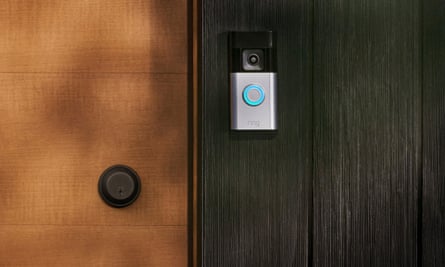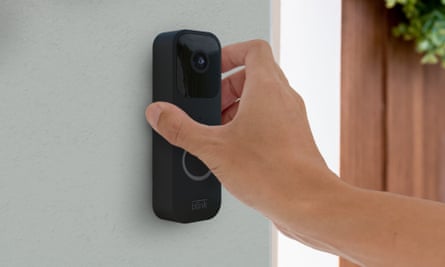Doorbells have evolved. Today, they watch us as we approach, let the people inside the home know we’re coming sooner than our finger can hit the button, and give them a good look at our faces before they open the door. They’re essentially security cameras with a chime function.
If you haven’t already installed one of these handy tools, there’s a huge array available. Choosing the best video doorbell can be a bewildering task, with various factors to consider, including how much of your doorstep you want to see or whether you’re prepared to pay for a subscription. To help make the decision a little bit easier, I’ve tested eight popular video doorbells to find the best.
At a glance
-
Best overall video doorbell:
Google Nest doorbell (battery)
£139 at Amazon -
Best budget video doorbell:
Blink smart video doorbell with Sync Module 2
£69 at AO -
Best subscription-free video doorbell:
Eufy video doorbell E340
£149.98 at Amazon
Why you should trust me
I’ve been testing products, including everything from vacuum cleaners and robot lawnmowers to computers and games, for various publications for more than three decades. I’ve also owned a video doorbell for a couple of years, so I am well aware of their strengths and weaknesses. It gives me a good understanding of what I’m likely to be looking for in the next one I buy.
How I tested
The only way to test a doorbell is to stick it next to your front door and see how well it works. To achieve this, I mounted all eight on a board at doorbell height and lived with this rigged-up contraption on my doorstep for a fortnight. Delivery drivers were rightly suspicious of the number of buttons and cameras, and struggled to work out whether it was them or the doorbells that were being tested.
I’m not sure whether my neighbours noticed them all, or spotted the number of times I lapped my drive at various times of day and night to test the movement sensors. If they did, they were too polite to mention it.
I compared the doorbells by measuring how close I could get to the door before the motion detection was triggered, how much video was recorded and how useful that footage was. I timed how long it took for notifications to reach the doorbells’ apps on a smartphone and how long it took for the doorbell to send an alert or ring a chime (if included) when its button was pressed. I also tested the apps, examined the prices and considered the additional cost of subscriptions.
All doorbells that didn’t need to be returned to the brands are being donated to the British Heart Foundation.
The best video doorbells in 2024
Best overall:
Google Nest Doorbell (battery)
Doorbells can be inundated with features, and their apps can be amazing. But if they don’t do a good job of letting you know when someone approaches your door and captures a video of them, there really isn’t much point. The Nest Doorbell (battery) performed these tasks the best.
Why we love it
In my tests, the Nest was a solid all-rounder. I found the viewing angle of its lens to be about perfect, not going so wide that people appear too small but still capturing enough of the surrounding area to catch people skirting around its periphery. The video and audio were as consistently clear as those on any of the doorbells I tested, and they were decent both in daylight and at night.
The Nest sometimes detected people right at the end of my drive but proved consistent at capturing movement from about 3m away. I found there was some delay between the button being pressed and notifications arriving on Nest devices and smartphones, but it averaged at a fairly reasonable five seconds. While not as fast as the doorbells that had dedicated local chimes, which tend to go off almost immediately, this was among the fastest for sending alerts to smartphones and smart speakers.
It’s a shame that … it doesn’t come with a chime. Instead, you need to buy a separate Nest Mini smart speaker, which costs £49. You also really need the Nest Aware subscription at £60 a year – without it, motion events are stored for only three hours, which isn’t hugely useful.
Subscription: Nest Aware (30-day storage, records only when movement triggered), £6/month or £60/year; Nest Aware Plus (60-day storage, records 24/7), £12/month or £120/year
Best budget:
Blink smart video doorbell with Sync Module 2
The Blink is the only model I reviewed that cost less than £100. Amazon’s bargain basement doorbell costs as little as £59 and, while you get what you pay for in terms of quality, it does the job.
Why we love it
Price is the key selling point here because it’s significantly more affordable than its nearest competitor. However, we reviewed the version that comes with Blink’s Sync Module 2, which costs only £10 more. This plugs into a wall socket and lets you connect USB storage (I used a USB flash memory drive). The device then locally backs up video that’s saved to the cloud, so you won’t lose any footage unless your local storage fills up. You still need a (relatively affordable) subscription for motion detection to work, though.
For a cheaper camera, I was impressed with the video footage. It has a wide-angle lens, so there’s a bit of a fish-eye effect around the edges, but it’s not so wide that people approaching the doorbell look tiny.
It’s a shame that … the two-way audio isn’t great. The quality of the microphone was the worst I tested, so it’s best suited to those not planning to have lengthy conversations with people on the doorstep.
Subscription: Basic Plan, £2.50/month or £24.99/year, single device; Plus Plan, £8/month or £80/year, multiple devices
Best subscription-free:
Eufy video doorbell E340
Most video doorbells provide limited features without additional costs, hiding all their best bits (such as storing video for any length of time) behind a paywall. The Eufy E340 is unusual because it ditches the paid-for subscription concept entirely.
Why we love it
The Eufy uses local rather than cloud storage, with 8GB built in to the device. How long that lasts before overwriting itself will depend on how busy your doorstep is. This built-in storage makes it one of the more expensive models, although that’s not its only trick. It uses two cameras, with an extra one pointed to the floor, so you can also keep an eye on parcels and packages (and analyse your visitors’ footwear).
It’s a shame that … while the stars have aligned over the Eufy’s video quality and lack of subscription costs, there were one or two occasions when movement didn’t trigger the camera early enough or at all. Ideally, I’d prefer something more reliable.
£149.98 at Amazon
£179 at John Lewis
Subscription: None required
The best of the rest
Aqara G4
Best for: no charging time
The big problem with rechargeable doorbell batteries is that there’s a period when they have to be removed from the door and charged up, at which point any visiting friends will have to knock and unwanted visitors won’t be recorded. This doorbell uses six AA batteries rather than a rechargeable, so its only downtime is while you’re replacing them.
This model also comes with the option of recording video to a microSD card, which slots into the supplied chime, sitting safely inside the house. However, it only provides access to the past seven days of video recordings through the app. To view further back, you have to remove the memory card and watch the files through a PC.
It didn’t make the final cut because … the app is nothing short of horrible. It has an AI chatbot. No, I don’t know why either. It was also one of the slowest to send notifications to a smartphone.
£119.99 at Amazon
£119.95 at Apple Store
Subscription: not required if using a memory card. A free subscription option downgrades footage to 360p and keeps it available for only seven days, so isn’t particularly useful. The paid-for tier stores at full 2K resolution and keeps it for 30 days, for $4.99/month (about £3.88) or $49.99/year (about £38.86)
after newsletter promotion
Ring Battery Video Doorbell Pro
Best for: Alexa users
The big brother of the Blink doorbell, with a price to match. If you’ve already bought into Amazon’s Echo smart speakers, this integrates smoothly with them.
It has the widest-angle lens of all the cameras here, but that makes the footage look like you’re viewing through a peephole. Faces standing any distance away are too small to capture much detail. It has one really clever feature, though: it records video constantly and uses it to extend recorded movement events further back in time, so you can see what happens in the seconds before someone arrives on camera.
It didn’t make the final cut because … it had the longest delay in sending notifications during testing, which was disappointing.
£129.99 at Amazon
£199.99 at John Lewis
Subscription: Basic, £4.99/month or £49.99/year; Standard, £7.99 per month or £79.99 per year
Yale smart video doorbell
Best for: field of view
The Yale doorbell proved reasonably responsive when it came to detecting movement, triggering when I was about 2.5m away. It has a medium field of view compared with its rivals. That means people are still reasonably sized in the captured videos, but it gets a fish-eye effect around the edges, making it tricky to catch people hiding or sneaking up.
The app is simple to use. It has few frills, but that may suit someone who doesn’t want their doorbell to be too complicated. There’s also internal storage, but only enough for two to four days, so it’s worth the subscription if you often go away for the weekend.
It didn’t make the final cut because … sound quality was the worst of the group, and the video had an unnatural colour tint.
Prices below include the chime
£149.99 at Argos
£159.99 at Yale
Subscription: from £3.50/month
Ezviz EP3x Pro
Best for: not running out of battery
If you don’t like the idea of charging or changing your doorbell’s batteries, the Ezviz eliminates these problems. It comes with its own solar panel, which attaches to the back of the device with a wire. As long as it can catch a bit of sunlight, it’ll keep your doorbell going indefinitely.
The Ezviz is a two-camera system, with one pointing downwards for watching parcels. It comes with 32GB of internal storage, so you don’t have to opt for a subscription, though you can add one if you want video saved to the cloud, too.
It didn’t make the final cut because … the movement detection and video recording didn’t kick in until people were 1m away from the doorbell, so it often started recording too late.
Subscription: 7-day video history, £4.99/month or £49.99/year; 30-day video history, £9.99/month or £99.99/year
Tapo D235 video doorbell camera
Best for: a good value camera with no subscription required
If our budget choice doesn’t appeal, then the Tapo D235 may suffice instead. It’s more expensive but sits comfortably in the middle of the price range of doorbells reviewed, and it can record video locally on a microSD card. However, there’s still a £2.99 a month subscription available. That lets you save captured footage to the cloud as well as or instead of a memory card and sends camera snapshots with its text alert notifications.
For the price, I was impressed with the quality of the footage captured, but it uses colour night vision as it gets dark, which was a bit too grainy. It has a wide 180-degree viewing angle and comes with a chime that sounds inside when someone pushes the doorbell button.
It didn’t make the final cut because … motion detection started at about 1.5m in our tests, which meant some movement was missed. Also, its wide-angle lens makes distant visitors appear small.
£104.99 from Tapo
£119.99 from Amazon
Subscription: Not required if using a memory card. Otherwise: Basic 7-day video history, £2.49/month or £24.99/year; Premium 30-day video history, £2.99/month or £29.49/year
What you need to know
As you may expect, buying a video doorbell isn’t (just) about whether the colour matches the paint job on your front door. Smart doorbells are crammed with features designed to make you think they sound good, luring you into choosing one over another. However, you should also take into account how good they are at alerting you when people arrive at your door, and whether you’ll be able to tell who it is when you watch a video or live feed on your smartphone, as I did in my tests.
If you have an existing wired doorbell, you can use its wiring to connect most video doorbells. If you’re not a competent electrician, you may need someone to install it for you. The benefit is that a device connected in this way will ring your existing doorbell chime.
Otherwise, you’re limited to a battery doorbell. These are much easier to install, but charging them can be a faff. You usually have to remove the doorbell and charge it overnight. During that time you have no doorbell or camera. Some doorbells come with regular batteries that can simply be swapped, while others can be kept topped up using a small solar panel, either out of the box or as an additional accessory.
Talking of accessories, it’s worth checking these out before you buy. If you want a chime that rings inside, you need to choose a model that supports this and has them available to buy.
If your house is already populated with Amazon Echo or Google Nest speakers, you can use these instead of chimes. That can help make your buying decision for you – there’s no point buying a Nest doorbell if you’ve already bought into Amazon’s devices – but some doorbells will happily work with either.
Andy Shaw is a freelance consumer journalist and technology addict. Having reviewed tech products professionally for more than 30 years, his favoured working environment is a small desk surrounded by big boxes. His greatest weakness is that he never, ever remembers how things came out of their boxes, so they rarely fit back in again when it’s time to send them back.


















